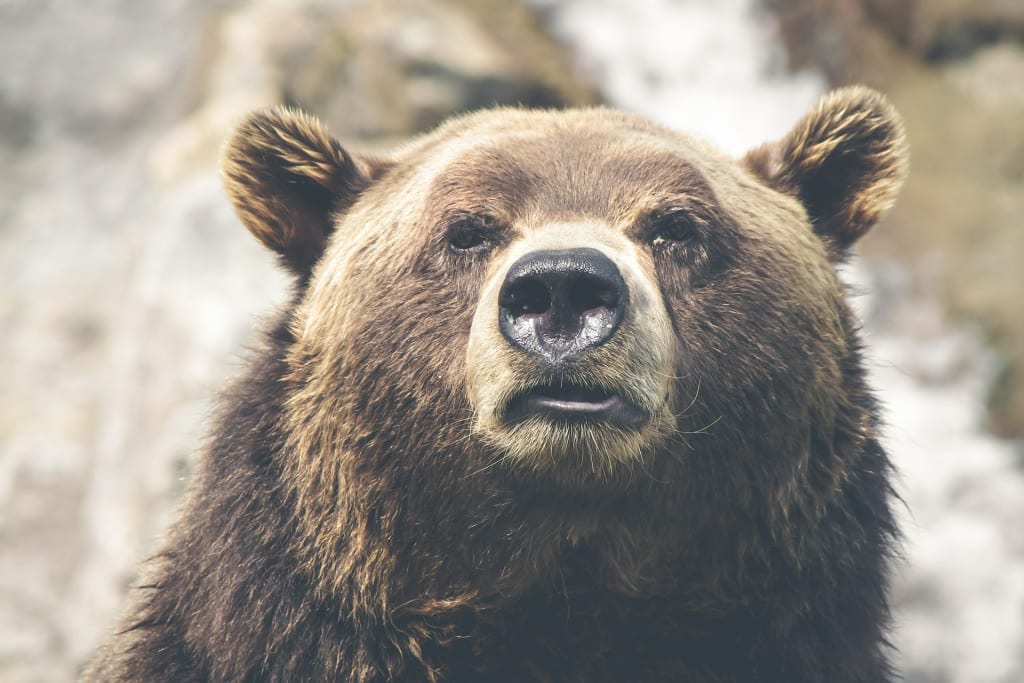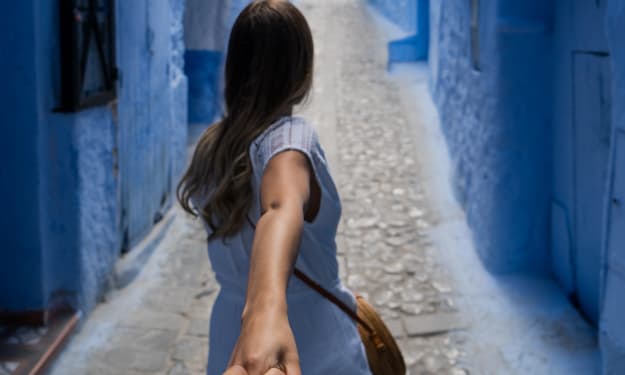Calling the Bear
Reveal your humanity and hold your ground.

Yesterday evening three swift knocks sounded at the door of my apartment.
I opened it expecting the faces of my downstairs neighbors —
a family who came to Georgia from Bangladesh
and just last week, brought home a newborn
who cries whenever my children’s footsteps thunder
across her ceiling.
But I saw nothing at my door except an empty stairwell,
and it was my children then who were up all night,
startled to attention by the mystery of who had been knocking,
their fear growing to fit the uncertain boundaries
of the unknown.
I have never seen a living bear up close, in real life,
but I have felt them in the forests of my childhood.
And a life-sized bear, stuffed by a skillful taxidermist,
greeted me and my children the one time in Maryland
when I took them camping on my own,
fleeing the makeshift loft in the instrument shop
where we spent summers in Osage, West Virginia,
winding my van along a spiraling path through unfamiliar trees
as darkness fell in waves.
The real life stuffed animal alerted us to the presence of the bears
beside our campsite.
Neither foreboding nor docile, it stood at attention,
a sign to be aware of your surroundings and act accordingly.
Meanwhile, the rangers who greeted us provided some guidelines
for living among the bears:
Try to avoid them.
Otherwise, hold your ground.
Reveal your humanity.
Speak clearly and calmly.
Slowly back away sideways.
Give the bear room to escape.
Above all, don’t feed them and don’t flee.
I watched as my daughter repeated the rangers’ rules,
but the most threatening creatures we encountered
were the officers who stopped me on the way home.
They directed me and my children to the curb
while they stretched gloves over their hands and searched
every canvas tote I’d filled with our belongings
for the trip that summer,
my 6-year-old daughter loudly listing the contents they would find
and taunting them as one might a rival team on a bright Friday night.
I soothed her with a reprise of what she’d learned camping:
These men are doing their jobs.
We will hold our ground calmly.
We won’t feed them our fears.
We won’t try to escape.
Meanwhile, my son, shy of 4 years old at the time,
words a new function of his autistic mind,
extended his arms, clapped toward our guarding officer
and said:
Hug Me.
The officer pointed to the steel strapped across his vest:
Not safe, Buddy. Too many guns.
Finally, the contents of our life poured back into our bags,
my license returned to my hand,
and we drove away slowly.
That summer was a declaration of independence for me,
though this rose like a long wave through the weight of years
filled with the muck of illness, infidelity and abuses,
laying bare beautiful wounds for healing.
In 2017, I joined women in Washington D.C. for the first march,
and then I joined women closer to home
within the mountain sweat lodge,
where we sit in ceremony,
honoring our ancestors and the Native American traditions
handed down through a legacy of grandmothers.
There are four rounds in the sweat lodge, and I learned
the final one is dedicated to The Bear.
It is also known as the round of the warrior.
Yet, it is always the third round which
brings visions of bears to my mind.
Symbolic of remembering ourselves and honoring our ancestors,
the third round begins, and I see myself sitting
with my head gently engulfed by a tiger’s gaping jaws —
at once threatening my life and protecting me from harm.
It’s a familiar state — the comfort of being at home
in a dangerous situation.
I ask myself how to safely get free.
The answer always comes: Call the Bear.
Once, a friend and I even lit candles, drew cards, burned intentions
and declared to ourselves and the universe:
We call the Bear into our lives.
Are bears lucky? Intelligent? Ferocious? Kind?
The picture that comes to my mind is that the bear
is a survivor.
And seeing them reminds us we
are survivors too.
Downstairs, the older brother of the newborn
breaks the blinds by pulling them apart to
peek out at the world of our parking lot.
His eyes preside over it like Dr. T.J. Eckleburg’s
watch over the expanse of highway
where Myrtle dies in Gatsby.
If anyone knows who darted up to our doorway it’s him.
As far as I’m concerned though, it was just the Bear,
leaving mystery and fear in its wake but
at last answering my call —
for the endurance of the survivor,
for the strength of the warrior
and for the memory of how it feels to be free.
About the Creator
Kelli Lynn Grey
I'm a professional copywriter & educator who writes essays and poems as Kelli Lynn Grey.






Comments
There are no comments for this story
Be the first to respond and start the conversation.